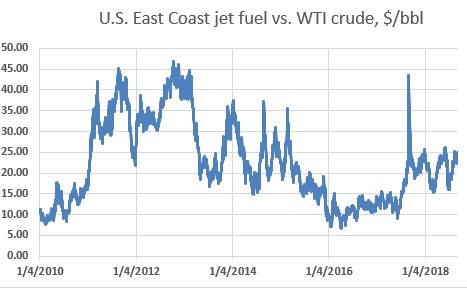It was always one of the more audacious and out-of-the-box deals for a transport sector company when Delta Airlines in 2012 bought a refinery near Philadelphia to help supply its system with jet fuel.
Delta bought the then-closed refinery, known as Trainer, from ConocoPhillips for an amount–$150 million–that it was noted at the time was about equal to the cost of one airplane. It led to a lot of head-scratching in both the oil refining and airline sector.
Delta is pulling back on the refinery somewhat, however, with an announcement late Thursday that it is seeking to form a joint venture to operate the plant.
Delta said earlier this week that it was seeking a joint venture for the refinery’s operations, and had brought in Barclays and Jeffries Financial to find a partner or partners and put together the transaction. According to a Delta prepared statement, the plan of the joint venture would be to maintain current levels of jet production, while the partner or partners would “focus on”–presumably, offtake and sell–the gasoline, diesel and other products produced at the 185,000 b/d refinery.
The purchase of the refinery by Delta might have been the most unconventional step by a company to hedge its commodity exposure. Companies with such exposure can do any one of several things to confront that risk: they can do nothing, which has the advantage of being able to completely take advantage of a beneficial shift in the market not being offset by a hedge but leaves the company completely exposed if the market goes against them; they can hedge against a market that goes against them in some sort of traditional commodity market, which creates a level of certainty but could prevent taking advantage of market swings because part of their exposure is locked in; or they can have a financial firm create for them a custom-written risk product, like a derivative, that can be costly but can be fine-tuned for a company’s needs.
Delta took a totally different track. It would be as if a food processor bought a string of farms, an auto manufacturer bought a steel company, or a trucking company bought a chain of truck stops…or bought a refinery, just like Delta did.
At the time of the deal in 2012, what Delta was seen as doing was not so much ensuring its supply of jet fuel, which was adequate, or getting it cheaper, because internal accounting would have forced Delta to have its airline division pay full price for the jet fuel coming out of Trainer.
No, what Delta wanted to do was capture the jet “crack,” the difference between the price of crude oil and the price of jet fuel. Airlines traditionally hedge their oil exposure by going long the crude market, so if the overall price of oil rises and the jet fuel price rises with it, their futures positions benefit and it softens the blow from the jet fuel increase.

But airplanes don’t run on crude; they run on jet fuel. Hedging jet fuel exposure can be complicated. There is no jet contract per se on a commodity exchange. But there is a diesel contract on the Chicago Mercantile Exchange, and diesel is a distillate, like jet. Still, airlines inevitably turned to the crude contract to hedge their exposure, because its volume is enormous, and liquidity is never an issue. You can always get in and out of a contract.
That still leaves an airline exposed to the vagaries of the spread between crude and jet. If you’re hedging on crude for your jet position, and jet blows out against crude, the ability of the crude hedge to soften the blow is reduced. Delta executives believed that by buying a refinery, it could capture the spread between jet and crude directly.
As far as whether it was a successful strategy, the relatively small amount that Delta paid for the refinery could mean that if it was a financial disaster, Delta could have shut it and written it down without a big impact on its balance sheet, but it never did that. East Coast refineries have struggled in recent years, for a complex brew of reasons that involve U.S. crude exports, the ethanol mandate tied with the refineries’ lack of a retail distribution network, and an inability to access cheaper U.S. crude except through an expensive Jones Act ship. One, Philadelphia Energy Solutions, filed for bankruptcy but has emerged and continues to operate.
“The Trainer Refinery brings nearly $300 million in annual value to Delta and we will continue to ensure this competitive advantage remains for our customers, employees and shareholders,” said Paul Jacobson, Delta’s Chief Financial Officer in the prepared statement, appearing to swat away any speculation that the joint venture was part of a first step toward getting rid of the refinery entirely.
The $300 million figure should be compared against the fact that Delta passenger revenue is in the $9-$10 billion range per quarter. Third party refinery sales–those outside of jet fuel transferred within Delta–was only $67 million in the most recent quarter.











